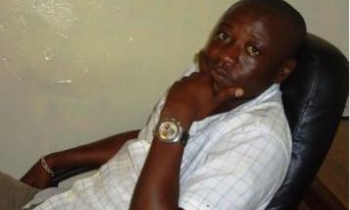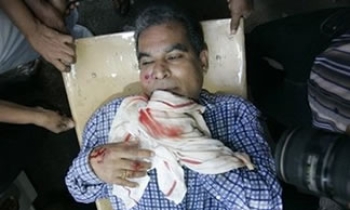The police fired warning shots at the scene of a double bombing Tuesday, enforcing an order banning news photographers and TV camera operators from filming the aftermath of deadly bombings, the Associated Press (AP) has reported.
The Iraqi government said it decided last weekend to keep photographers and camera crews away from blast sites to prevent them from damaging forensic evidence. Press freedom groups feared the order was aimed at preventing scenes of horrific carnage from being broadcast around the world.

The ban got its first test Tuesday, when a pair of bombs hidden in plastic bags exploded in two shops selling CDs and cigarettes in Tayaran Square in central Baghdad. Police said seven people were killed and 17 wounded.
News photographers and cameraman rushed to the scene only to be turned away by Iraqi police, who fired warning shots in the air to disperse the crowds.
Interior Ministry spokesman Brig Gen Abdul-Karim Khalaf defended the decision and said it would only last for an hour after the explosion. He said the move was not designed to curtail press freedom but to protect evidence and the privacy of the wounded. He also said the government wanted to keep insurgents from filming the scene for use in propaganda videos.
"I would like to say that this is not a total ban. It is a short ban because after one hour from the explosion, journalists will have the freedom to do their work," he added, saying the ban was nationwide and would include the state-run TV station Iraqiya.
"We do not want evidence to be disturbed before the arrival of detectives, the ministry must respect human rights and does not want to expose victims and does not want to give terrorists information that they achieved their goals," Khalaf told Agence France-Presse (AFP). "This decision does not imply a curtailment of press freedom, it is a measure followed all over the world."

Iraqi and US authorities have frequently complained that the publicity surrounding car bombings and suicide attacks is jeopardising their efforts to stop the violence, which has proven unrelenting as Sunni insurgents adopt new tactics to evade stepped-up security measures.
Reporters sans Frontières (RSF) expressed concern, saying it "feared that growing restrictions on the media could end in a total news blackout." RSF said, "It is vital that journalists can report on the security situation throughout the country without it being seen as incitement to violence. When the streets become impassable and the authorities provide no information about the attacks in real time, the role of the reporter becomes essential. Coverage of these attacks allows people to evaluate the security risk and to avoid dangerous areas."
Shihab al-Tamimi, the head of the Iraqi Journalists Union, said he understood the Interior Ministry's concerns. "But at the same time, the security forces should give more understanding to the work of journalists. The journalists have a job to do and they should be able to do it if it does not break a law. For example, if a photographer is after a picture at the explosion site, that does not make him a propagandist for insurgents," al-Tamimi said.
While the photo ban is a new development, authorities in Iraq have been suspicious about photojournalists at bomb scenes, claiming that the journalists may have advance knowledge of insurgent attacks, the AFP report said.

After Reuters photojournalist Ali Omar Abrahem al-Mashhadani was arrested by the US military in 2005, a military spokesperson said journalists who frequently appear at bombing scenes are sometimes detained for questioning. Mashhadani was held for five months and released. The military cited bombing photographs by AP photojournalist Bilal Hussein as one of the reasons he is being detained as a security threat. He has now been held for 13 months.
Iraqi authorities often have been criticised for imposing media restrictions since the US-led invasion that ousted Saddam Hussein in 2003. In August 2004, the government closed the Baghdad news office of Al-Jazeera television, accusing the station of inciting violence. The office is still closed but the station operates in the Kurdish-ruled area of the north. In December 2006, parliament also briefly banned journalists from covering its sessions.
The same parliament voted by a majority, on May 9 to take legal action against Al-Jazeera. This came a few days after it broadcast a programme in which the political legitimacy of the Shiite leader, Ayatollah Ali Sistani, was called into question. Members of the Shiite community joined demonstrations against the TV in the cities of Basra and Najaf, and in the south of the country. Al-Jazeera has not been allowed to work in Iraq since August 2004, the government charging it with “incitement to violence” for showing videos made by armed groups. Following the vote, several members of parliament also proposed taking the channel before the International Criminal Court at The Hague.









